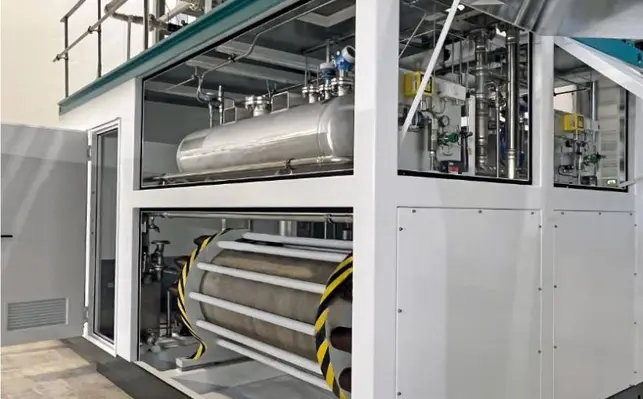Ecoclean has started series production of modular AEL electrolysers on a megawatt scale, which are low-maintenance and scalable
In order to produce green hydrogen in a cost-effective, decentralised manner, efficient electrolysers are required. One such solution is EcoLyzer, modular systems for pressurised alkaline electrolysis, which Ecoclean recently launched in series production. The robust, low-maintenance electrolysers from the globally active company are available as scalable solutions with outputs ranging from 1 to 20 MW.
After initially building a test bench for testing and validating electrolysis stacks with a diameter of up to 1,500 mm and a maximum output of 500 kW, as well as constructing an electrolysis demonstrator ready for series production, Ecoclean is now is now starting series production of the EcoLyzer systems.
The technology behind these compact electrolyzers is based on a system for pressurised alkaline electrolysis that has been developed and optimised by the Centre for Solar Energy and Hydrogen Research Baden-Württemberg (ZSW) over the last ten years. One of the advantages of this proven and robust technology is that it does not rely on scarce raw materials such as precious metals or rare earths.
Designed as modular units, the electrolyzers can be used to build cost-efficient systems with an output of 1 to 20 MW close to the energy generator (solar, wind, water), which can be easily expanded at a later date. The modular principle not only means that the electrolyzers can be manufactured economically, but also ensures comparatively short delivery times of currently twelve months.
The systems deliver high gas quality and a system pressure of up to 30 bars as standard.
Read more on our hydrogen coverage
Scalable solutions for efficient on-site hydrogen production
The EcoLyzers enable energy-intensive branches of industry such as the steel and chemical industries to produce green hydrogen economically, on site, and in the required quantity and quality. This ensures a high security of supply and logistical independence at competitive costs per kilogram of hydrogen. In the mobility sector - whether on- or off-road, passenger or freight transport - hydrogen produced by alkaline electrolysis and green electricity enables cost-effective decarbonisation without the exploitation of raw materials such as precious metals and rare earths.
Regardless of whether the vehicle is powered by a fuel cell or combustion engine, fast refueling and long ranges are further advantages that speak in favor of hydrogen and its decentralised production. This makes EcoLyzer solutions particularly interesting for local authorities and haulage companies that want to set up hydrogen filling stations, for example.
The production of electricity from solar radiation and wind rarely coincides with demand. Converting surplus electricity into easily storable hydrogen via electrolysis helps to stabilise the power supply. This is because it can be converted back into electricity using a fuel cell and fed into the grid during dull periods.








